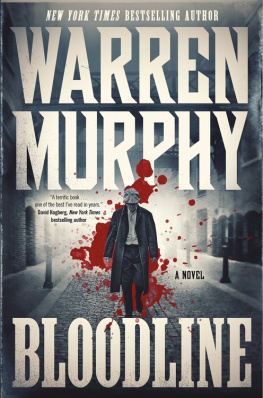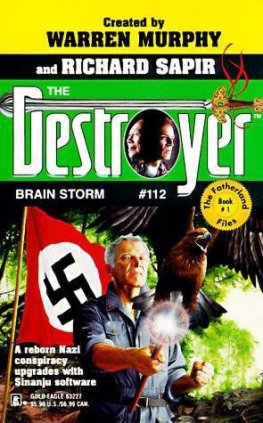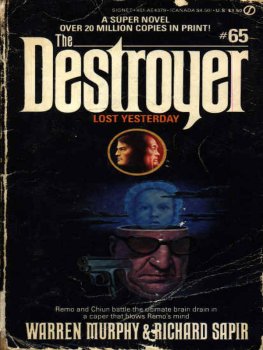Destroyer 98: Target of Opportunity
By Warren Murphy and Richard Sapir
Chapter 1
Everybody thought they recognized the man who tried to assassinate the President of the United States, but ten minutes after he left their sight, no one could remember his face.
The assassin had that kind of face. It was nondescript. Slight of build, vacant-eyed, weak-chinned, pasty-faced, he looked like a nobody. The quintessential nobody.
It was exactly his utter nobodyness that made him slip from memory as soon as he was out of sight.
Yet everyone who got a good look did a double take.
The desk clerk at the Government Center Holiday Inn in Boston, Massachusetts, found himself scrutinizing the man's receding hairline when he presented himself to the front desk, saying, "I have a reservation."
"May I have your confirmation number?" the desk clerk asked, fingers hovering over the reservation terminal.
"Number 334433," the man said from memory. His voice was neither high nor low, loud nor soft. Nor was it evenly modulated. He spoke with a nervous, halting tone.
When the man's name came up on the screen, the desk clerk failed to recognize it. It was only when he asked for the credit card that he looked more closely at the face. It was one of those new picture-ID credit cards. His face struck a chord in memory.
"Have you stayed with us before?" the clerk asked pleasantly.
"No," said the man. He did not look away. Nor did he meet the desk clerk's eyes. He was standing right there, but he seemed as conspicuous as the brass ashtrays that dotted the bright lobby. There but not there. Decoration. Unimportant-unless you had to get rid of a cigarette butt in a hurry.
"I thought you looked familiar, Mr.-" the clerk read the name off the credit card "-Hidell."
Alek Hidell said nothing when he accepted his credit card back.
The desk clerk banged the front bell and, as the bellboy bustled up to scoop up Alek Hidell's two suitcases, he watched Hidell walk toward the elevator, trying to place his face.
He looked so damn familiar . . . .
Then the elevator doors closed on his impassive, pasty features, the desk phone rang and the clerk put the man completely out of his mind.
He only recalled him again when the Secret Service showed up the next day. By then, it was too late to be a national hero.
ALEX HIDELL was next noticed riding in the back of the last car of a four-car Silverbird subway train as it rattled south through the Red Line tunnel between Charles Street Station and the JFK- UMass stop later that day. Noticed and dismissed from memory. Although several passengers looked twice at him as he sat swaying in his seat, clutching a shapeless duffel bag that bulged with something hard and angular. But almost everyone clutched something. It was the week before Christmas.
The driver of the shuttle bus to the University of Massachusetts Harbor Campus also looked twice when the nondescript Hidell boarded his bus just outside the JFK- UMass station.
I've seen that guy before, the driver thought to himself.
Five years of driving the shuttle bus between the JFK- UMass Red Line station and the college had brought him into contact with thousands of riders, most of them students and faculty. A familiar face unless it was a pretty one-shouldn't have caused his eyes to go to the interior rearview mirror all the time the nondescript passenger rode the bus. But this guy's face did.
He sat in the back, gazing out the window, lost in thought. There was a suggestion of a sly smile lingering on the passenger's lips. It was that, not the undershot jaw or dreamy eyes, that kept drawing the bus driver's gaze.
Where have I seen that guy before? he kept asking himself.
He looked fiftyish. Not too old to be a student, technically. But fiftyish students at UMass were comparatively rare. And he looked too vacant to be faculty. Even UMass faculty.
The little guy had never ridden the UMass shuttle. The driver was sure of that. This wasn't a passenger-I-haven't-seen-in-a-long-time experience, he decided. This was a guy-I-haven't-seen-since-high-school experience.
But the bus driver hadn't known the solitary passenger back in high school, either. Maybe grade school. Maybe that was it. He had known the passenger back in grade school before his jaw and hairline receded. Before the brownish hair that sat on his head like a disturbed wig had begun to thin out.
But much as he tried, the bus driver couldn't put a name to the annoyingly familiar face.
The shuttle bus trundled off Morrissey Boulevard and up the lone access road to the imposing complex of chocolate brown brick buildings that comprised the University of Massachusetts at Boston. It came to a stop in the sheltered concrete trough between the administration building and the parking garage under the elevated campus plaza.
The passenger got up and left the bus by the rear door, stepping through to the steel door to the underground garage so quickly he was hardly noticed.
In that brief span of time, the driver followed him with his eyes. Even his jerky walk rang a dim memory bell.
Then the bus filled with departing students and faculty, and the driver closed the doors and continued on his monotonously circuitous route.
By the time he pulled out into the daylight of Columbia Point and the John F. Kennedy library, he had put the disturbingly familiar passenger out of his mind.
NO ONE NOTICED Alek Hidell as he strode through the ill-lighted underground parking garage to the elevator marked Science Center. He waited patiently for the elevator and rode it to the top floor, then worked his way through the narrow corridors until he came to the rooftop greenhouse, a pair of Ray-Ban Aviator sunglasses blocking his eyes.
The warm, moist air smacked him in the face when he opened the door. By that time he was already sweating anyway.
A denim-clad woman looked up from tending rows of Christmas cactus. "Yes?" she said.
"Secret Service," he said, flashing a gold badge clipped to his wallet. "You'll have to vacate."
"Why?"
"This spot makes a perfect sniper's nest. We're sealing it off."
"Now? The President isn't due until tomorrow."
"Now," said Alek Hidell.
The young woman gathered up her purse and books, saying, "Will I be able to water my plants tomorrow?"
"Sorry!"
"Could you water them for me?"
"I'll think about it," said Alek Hidell, shutting and locking the greenhouse door after her.
When the elevator doors ran shut, he stripped off his coat and shirt and hunkered down on the tile floor in his undershirt. Extracting the sections of his rifle from his duffel bag, he began assembling the weapon.
When it was all together, he took an oily rag and began polishing it, his pouty lower lip growing moist in the close humid air.
He was still polishing it the next morning when a Secret Service agent stepped off the elevator. Hidell ditched the rifle under a shelf and went to the greenhouse door where the agent stood, his face like a rock behind his impenetrable sunglasses.
"'You'll have to vacate this area," the agent said, flashing his gold badge. "Security precaution."
"Make me," Hidell said in a self-effacing tone.
"I didn't catch that," the agent said, leaning forward.
"I said, 'Make me.'"
The agent's face gathered around the edges of his Ray-Ban Aviators like a wet rag wrinkling up. He stepped into the greenhouse, his right wrist lifting to his mouth. He never got a chance to speak into the flesh-colored wrist mike.
Alek Hidell whipped the rifle from the concealing shelf and shot the agent square in the nose. The slug came out the back of the agent's head. He stumbled back and when he hit the tile, Hidell finished him off with a second shot to the throat.
Next page



